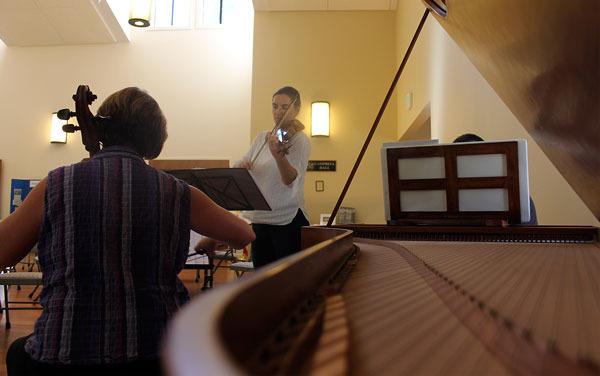While there are plenty of similar music festivals these days, it can be tough to find a festival with a unique musical lineup, but South Enders don’t have to look far to find one.
Rare, centuries-old sounds can be heard this weekend as the Whidbey Island Music Festival tunes up for a second weekend at St. Augustine’s in-the-Woods at 7:30 p.m. on Friday evening. The festival, running for the 11th year, teleports audiences back in time to the era of early chamber music. Each year’s musical program is different from the last, highlighting different composers, styles and regions. 2016’s installment dives headfirst into the baroque music primarily of central Europe and includes antique instruments many haven’t seen in a live performance.
Tickets cost $20, $10 for students and military. Children get in for free.
Whidbey Island Music Festival Director Tekla Cunningham has set up four separate musical programs within the festival, with two programs running each weekend. Program III on Friday evening and Sunday afternoon will see the church filled with festive music meant for the powerful patrons of 17th century Vienna, the era before Mozart took the Viennese music scene by storm. The program features numbers from composers such as Biber, Schmelzer and Muffat and will see an eight piece ensemble take the stage with rare baroque violins, valveless trumpets, a harpsichord and rare instruments such as violas da gambas and a theorbo. Sunday’s program begins at 3 p.m.

“There are only a couple of places in the U.S. where people specialize in this type of music, so it’s not our everyday classical music concert,” Cunningham said. “We wanted to highlight places with great music culture, and we landed on Vienna, Dresden and Salzburg.”
Program IV at 7:30 p.m. on Saturday evening continues with the Austrian theme, but shifts the focus toward late 17th and early 18th century Salzburg. The program will present Cunningham’s newest ensemble, Artifice, which will explore Salzburg’s music that predated the birth of the city’s most famous son, Mozart. The first program that ran July 29 and 31 featured music from Pisendel and Veracini of Dresden’s music scene in the 18th century. The second program on July 30 focused on Dresden-made sonatas for violins.
The festival is a history lesson of sorts, Cunningham said. Many of the instruments being strummed and played are antiques built more than 200 years ago, including Cunningham’s baroque violin, which she says was built in Venice in the 18th century. She says the viola d’amore is another instrument rarely heard by the common ear, and one piece during Program IV will have a piece that features two of them.
“All the instruments are either originals or copies of originals,” Cunningham said. “They’ll allow listeners to hear the sound these composers were going for, because the songs sound different on modern instruments.”
Historical keyboardist Henry Lebedinsky, who played the harpsichord during the first two programs last weekend, said as a musician who plays historical music, or art music as he calls it, one educates the audience while simultaneously entertaining. He says a concert such as the Whidbey Island Music Festival may be a crowd’s first exposure to composers such as Pisendel or Biber, and it’s important to provide some context for the music since learning the history enriches people’s understanding of music in general.

“The thing about history is it enriches our world view,” Lebedinsky said. “Just look at Shakespeare: he has so much to teach about the human condition that’s useful today, and music is the same.”
It’s the historical aspect of the festival that makes it unique, said David Locke, parish musician at St. Augustine’s in-the-Woods, and Cunningham is an expert in the history of chamber music. She juggles numerous jobs and gigs at once, including scholarly work as a member of the early music faculty at Cornish College of the Arts and as an artist in residence at the University of Washington. She is also concertmaster of Pacific MusicWorks and former second violin with Seattle Baroque Orchestra and Soloists. Numerous instruments are in her playing repertoire, including violin, viola and viola d’amore.
“Tekla is a wonderful musician and a scholar of the early literature for styles, and she really excels at stylistic performance,” Locke said. “She and the others are first rate.”
While introducing the ensemble for the first program this past Friday, Locke said people would normally have to travel far to see a classical performance of this calibre. The music featured is only prevalent in a few cities around the world, says Locke, and jokes that the festival puts Freeland on the map alongside Amsterdam, San Francisco and Boston.
“I think the community is really lucky to have someone like Tekla organizing this festival; she has really put in the time to give the area this beautiful gift of baroque music.”

